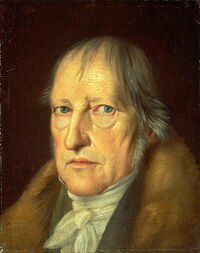 The Right Hegelians, Old Hegelians, or the Hegelian Right, were the followers of German philosopher Georg Wilhelm Friedrich Hegel who took his philosophy in a politically and religiously conservative direction. They are typically contrasted with the Young Hegelians, who interpreted Hegel's political philosophy to support innovations in politics or religion. Hegel's political philosophy could be read in liberal or conservative directions.
The Right Hegelians, Old Hegelians, or the Hegelian Right, were the followers of German philosopher Georg Wilhelm Friedrich Hegel who took his philosophy in a politically and religiously conservative direction. They are typically contrasted with the Young Hegelians, who interpreted Hegel's political philosophy to support innovations in politics or religion. Hegel's political philosophy could be read in liberal or conservative directions.Hegel's historicism held that both ideas and nations could only be understood by understanding their history. Throughout his life, Hegel was an orthodox member of Prussia's Lutheran Church. He devoted considerable attention to the Absolute, his term for the totality of reality that was used in his philosophy to justify belief in God. In his Philosophy of Right, Hegel wrote that:
The State is absolutely rational inasmuch as it is the actuality of the substantial will which it possesses in the particular self-consciousness once that consciousness has been raised to consciousness of its universality. This substantial unity is an absolute unmoved end in itself, in which freedom comes into its supreme right. On the other hand this final end has supreme right against the individual, whose supreme duty is to be a member of the State.
— Philosophy of Right, "The State", s. 258
More...


No comments:
Post a Comment